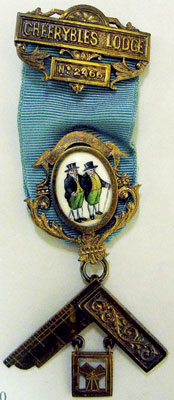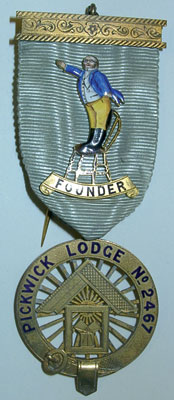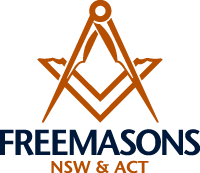
2012 Dickens' Year

2012 is the bicentenary of the birth of the novelist Charles Dickens, an event that is being marked with new biographies and exhibitions. Dickens was not a Freemason but was great friends with many Freemasons and occasionally refers to Freemasonry in his novels.
Names and history of a number of lodges have Dickensian links. The first two were both established in the early 1890s. Cheerybles Lodge No 2466 was named after the two brothers in Nicholas Nickleby and they are depicted on the lodge jewel.
The lodge history explains that two brothers 'exemplified ... the characteristics of good humour, simplicity, generosity and selflessness' in contrast with other less worthy characters in the book. 'They exhibited so many of the virtues which animate Freemasons' to such an extent that it was appropriate to name a lodge after them. The founders of the lodge were drawn from members of Cheerybles Musical Society, which combined a love of music and Dickens.

 Pickwick Lodge No 2467 was founded by members of the Pickwick Bicycle Club, itself named in honour of Dickens. There was a tradition of members of the club giving themselves Pickwickian names. Edward Hollands, one of the founders of the lodge, whose jewel is shown here, was known as Mr Blotton of Aldgate. The jewel shows the figure of Mr Pickwick standing on a chair.
Pickwick Lodge No 2467 was founded by members of the Pickwick Bicycle Club, itself named in honour of Dickens. There was a tradition of members of the club giving themselves Pickwickian names. Edward Hollands, one of the founders of the lodge, whose jewel is shown here, was known as Mr Blotton of Aldgate. The jewel shows the figure of Mr Pickwick standing on a chair.
Charles Dickens Lodge No 2757 was formed in 1899 and met socially at the King's Head Inn in Chigwell. Constructed in the seventeenth century, the pub was made famous by Dickens in his 1841 novel Barnaby Rudge. In the 1800s it was a popular dining venue for men from the city and several lodges also arranged summer outings and meetings there.
A second Pickwick Lodge No 5448 was formed in 1934 and met at the Leather Bottle Inn at Cobham in Kent. The area has many Dickens associations. The author himself often visited the inn, which he described in Pickwick Papers, as a 'clean and commodious village ale house'.
The fascination with Dickens has continued as, in the early 1970s, Barnaby Rudge Lodge No 8589 was formed in Essex by Freemasons associated with a lodge of instruction meeting at the real Maypole Inn in Chigwell.
Dickens, the eldest son in a family of eight, saw a number of his brothers become masons. His own son Charlie, the eldest of Dickens' ten children, became a Freemason in Maybury Lodge No 969. This lodge had many links with the theatre and was particularly associated with the project to establish a Royal Dramatic College near Woking as sheltered accommodation for aged actors, a cause which Dickens Senior wholeheartedly supported.
In 1876 Charlie Dickens was proposed for membership of a Royal Arch Chapter, British Chapter No 8. In 1886 he joined the then recently formed Drury Lane Lodge No 2127.
This article is an extract taken from the SQUARE, a magazine for Freemasons in England, with approval from 'Friends of the Library and Museum of Freemasonry'. www.freemasonry.london.museum
Article extracted from Freemason magazine, December 2012, page 16.


